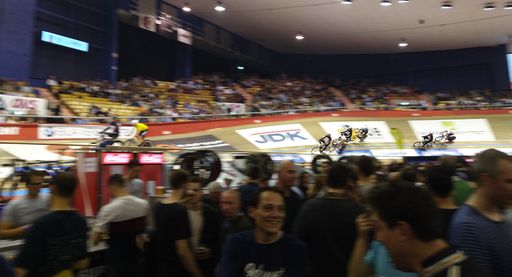It’s hot in here. It smells like a grease fire. A euro-pop remix of Sweet Caroline rings out above the hubbub and everyone in the place – all of whom, having pounded lager after lager, are caught up in a communal, red-faced euphoria – is singing along. Oh, and there is a bike race going on. Welcome to the Ghent Six Days.
’T Kuipke (“the dish”) sits at the edge of Ghent’s Citadelpark. On Saturday evening, at the start of the penultimate night of racing, we joined a steady stream of other race-goers making their way into the anonymous, blocky building. In the darkness and the quiet of the park it was difficult to get much of a feel for where we were headed, but the ranks of parked omafiets and a discreet public pissoir lent proceedings a low-key, low country feel.
Tickets shown, wrists stamped, and we were into the undercroft, all curving corridors and encroaching ceilings. Above our heads were the grandstands that looked down upon the track so that their occupants could look up to the riders. We had tickets for the infield, but first we needed food and drink, and here we found out that the bars and food concessions didn’t accept money but rather meal tickets bought for €1.35 apiece.1 Choices were expensive and sparse – bratwurst or burgers, lager or strong lager, red or white wine – but, if you could make your peace with that, they fitted the proceedings just fine. This was cycling as darts tournament, and it was a thing to behold.
I have never seen so many sweaty white men in one place. Down in the infield, the mosh pit, all eyes were fixed on the racers as they whipped round the track, so that the choice was to rotate bodily in place or follow them with your head, whipping it back around when it wouldn’t go any farther. It was exhilarating and lightly nauseating at the same time. In the seats above the track, things were more genteel: the ratio of men to women dipped below double figures, the average age skewed upwards, and heads followed racers without fear of whiplash. In all ways, the stands were elevated.

When not on the track, the racers were squeezed into a narrow band between the infield and the côte d’azur, close enough to touch as they warmed up on rollers. A few bold fans leaned against the barrier that separated us from them, up in the riders’ grills as they sweated and spun between races. And the races, my God, the races. The madison. The derny race. The super sprint. The points race. The elimination race. I’d read Lionel Birnie’s genial guide to the Ghent Six a few days before we arrived, with its coy suggestion that there may be an element of stage-management to the final outcome of the tournament, but to watch the riders flash round at almost 70 kilometres per hour was to be convinced that it really didn’t matter.
The Ghent Six is all about ritual. The drunken lads stacking plastic beer cups into swaying towers. The Belgian folk songs that had the entire audience, whether down on the infield or up in the stands, on their feet. The podium girls (!, ?) and victory laps after every race. The derny riders puttering round in formation before their big moment, nodding sagely to familiar faces in the crowd. At the start of one race, Mark Cavendish, this year’s big star, led his fellow riders in a neutralised ten-lap procession while whipping the crowd into a frenzy to the sound of We Will Rock You. (He lost the race.) Before another, the racers formed a guard of honour for Moreno de Pauw, retiring from pro cycling at 28.
As the night wore on the temperature rose inexorably, driven upwards by perspiring bodies and sizzling hotplates. Had we been in France, I might have made a tired joke about boiling frogs; here, in Belgium, we were more like steaming mussels. We capitulated just before midnight – the riders would race on until 1am – and the winter cold was a relief when we stumbled outside.
It was awesome. We’ll be back.
“Last year’s tickets (€1.25) NOT accepted!”, warned a sign at one of the bars, and I was tickled by the idea of veteran six-dayers banking spare tokens in the hope of using them again at next year’s event. Perhaps the caterers are more lenient during recession years? ↩︎